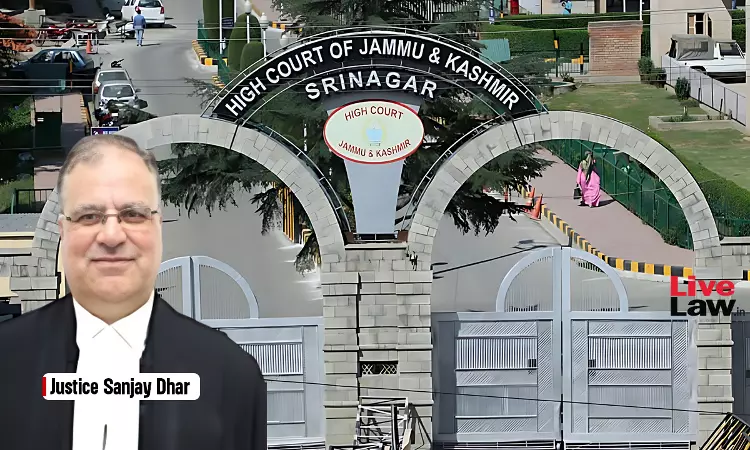- Home
- /
- High Courts
- /
- High Court of J & K and Ladakh
- /
- Delinquent Employees Entitled To...
Delinquent Employees Entitled To Copy Of Enquiry Report Even In Cases Where Rules Governing Disciplinary Proceedings Are Silent: J&K High Court
LIVELAW NEWS NETWORK
24 April 2024 9:45 AM GMT
Reaffirming the rights of government employees facing disciplinary actions the Jammu and Kashmir and Ladakh High Court has ruled that delinquent employees are entitled to a copy of the enquiry report, even in cases where rules governing disciplinary proceedings do not expressly provide for the same.Referencing Union of India and others v Mohd Ramzan Khan 1991 whereby the Supreme Court held...
Reaffirming the rights of government employees facing disciplinary actions the Jammu and Kashmir and Ladakh High Court has ruled that delinquent employees are entitled to a copy of the enquiry report, even in cases where rules governing disciplinary proceedings do not expressly provide for the same.
Referencing Union of India and others v Mohd Ramzan Khan 1991 whereby the Supreme Court held that whenever the Enquiry Officer is other than the disciplinary authority and report of the Enquiry Officer holds the employee guilty of charges, the delinquent employee is entitled to a copy of the report to enable him to make a representation to the Disciplinary Authority a bench of Justice Sanjay Dhar observed,
“..the ratio laid down by the Supreme Court in Mohd. Ramzan Khan's case (supra) applies to employees of all establishments whether Government, non Government, public or private, even if, the rules governing the disciplinary proceedings do not expressly provide for the same”.
Justice Dhar explained that whatever may be the nature of the punishment to be imposed, whenever an enquiry is held and punishment is proposed to be inflicted, an employee must have the benefit of report of enquiry so as to enable him to make a representation before the Disciplinary Authority.
These observations came in a petition about the long-standing case of Vinod Kumar, who was placed under suspension by the Jammu Municipal Corporation in 1988 for allegedly skipping election duty. Kumar challenged the suspension order and was reinstated in 2001 with a censure penalty.
However, the corporation further contended that his absence during suspension amounted to unauthorized absence and treated the period as 'dies non', effectively denying him salary and seniority benefits.
Kumar then filed multiple writ petitions challenging these actions. In 2015, the High Court directed the corporation to hold a fresh enquiry following due procedure. The enquiry, conducted after Kumar's retirement in 2012, concluded that he remained absent without authorization. Based on this report, the corporation issued an order treating the disputed period as dies non and withholding salary dues.
Kumar challenged this latest order through the present writ petition arguing that he had been regularly attending duties during the disputed period and was wrongly suspended. Conversely, the respondents, including the Jammu Municipal Corporation, asserted that an enquiry had established his unauthorized absence.
Adjudicating the matter Justice Dhar acknowledged the Court's earlier directions in allowing the enquiry to proceed despite Kumar's superannuation. However, it placed significant emphasis on the violation of natural justice principles.
The Court extensively quoted the J&K Civil Services (Classification, Control and Appeal) Rules, 1956, and observed for imposing penalty inter alia specified in clause (iii) of Rule 30 of the Rules, a Government employee has to be given adequate opportunity of making representation before issuing the order imposing penalty and the said representation has to be taken into consideration before the order is passed.
However, the court also noted that there was nothing in the said Rule, which mandated an employer to furnish a copy of the enquiry report to a delinquent employee.
Emphasising that even in the absence of explicit provisions in disciplinary rules, Justice Dhar stressed that delinquent employees must be provided with the enquiry report to ensure a fair opportunity to defend themselves hence underscoring the right of the employee for effective representation before the Disciplinary Authority.
It further bolstered its position by citing Supreme Court judgements in Mohd Ramzan Khan & B. Karunakara cases which establish that receiving a copy of the enquiry report is crucial for an employee to effectively counter the findings and defend themselves.
“Whenever an enquiry is held and punishment is proposed to be inflicted, an employee must have the benefit of report of enquiry so as to enable him to make a representation before the Disciplinary Authority. Thus, even if, Rule 35 of CS(CCA) Rules does not provide for furnishing of report of the enquiry to a delinquent employee, still then he has to be provided the same to enable him to make a representation', the bench remarked.
In the instant case, the bench noted that the record produced by the respondents did not even remotely suggest that the enquiry report was at any time furnished to the petitioner nor did it suggest that copies of the communications furnished to the Enquiry Officer by the Sections Heads were provided to the petitioner.
In light of these legal infirmities, the court quashed the impugned order treating Mr. Kumar's absence as unauthorized and directed the release of withheld salary. Furthermore, it ordered his retroactive promotion to Senior Assistant.
Case Title: Vinod Kumar Vs Jammu Municipal Corporation and another
Citation: 2024 LiveLaw (JKL) 91
Mr. Rahul Pant, Sr. Adv. with Ms. Arushi Shukla, Adv.appeared for the petitioner, Mr. S. S. Nanda, Sr. AAG represented the respondents.


